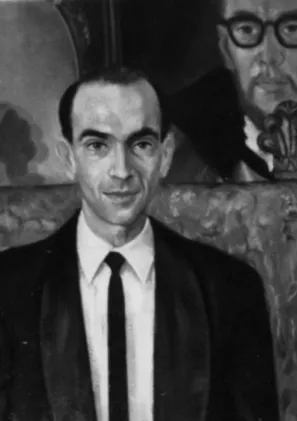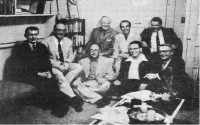Biography
1919 - 1991
“It gave me a strong sense of the existence of homosexuals as a [minority] group which I had never thought about before.”
– Tony Segura recalling how he felt after reading the book, The Homosexual in America by Donald Webster Cory in 1954.
One of the most important early LGBTQ rights organizers, Gonzálo “Tony” Segura Jr was born in Cuba in 1919 and emigrated to the United States when he was 15 years old. He went to military school in Georgia and then Emory University in Atlanta. After graduation he moved to New York City where he utilized his master’s degree in chemistry for his first job as a research chemist and stayed in that field for the rest of his career. Little is known about Segura’s early life except for what he decided to include in a 1977 oral history that he recorded with trailblazer LGBTQ historian Jonathan Ned Katz. These two audiocassettes are housed with Katz’s papers at the New York City Public Library. Segura told Katz that he realized he was gay in a gradual fashion throughout his younger years and kept it to himself until he was living in New York City. In 1954, Segura visited a Cleveland, Ohio bookstore during a business trip and happened upon Donald Webster Cory’s (Edward Sagarin’s pseudonym) groundbreaking 1951 book The Homosexual in America which marked a turning point in his life. He sought out as many reference materials that were included in the book’s bibliography. Cory also created the Cory Book Service which sold his book and other LGBTQ-focused books and had a location near Segura’s workplace on First Street in New York City. Segura visited that location one lunch hour, and this forever changed his life. He quickly learned about the international publication community from ONE, Inc.(he persuaded them to publish Spanish language editions for people in Mexico City, Mexico to expand their reach) in Los Angeles to Arcadie in France. Since Segura also spoke Spanish and French, he helped with the Cory Book Service’s Latin American correspondence. Segura also started attending meetings of the secretive group The League in a Lower East Side of Manhattan loft where about 20 mostly gay men gathered and whose main goal was to combat the fear that pervaded the queer community in the 1950s. Realizing that it was better to be out in the open, Segura and a fellow The League member Sam Morford co-founded the New York City Area Council of the Mattachine Society, Inc. (the fifth one in America) which incorporated on December 10, 1955. Segura was elected to the post of public relations director at the May 1956 national meeting of the Mattachine Society, Inc., served as the vice chair of the New York City branch, was an editorial board member of the Mattachine Review and spoke at various councils around the country. He holds the distinction of being the first out gay man on television on the East Coast (he had to wear a disguise and use a fake name to avoid being arrested) when he appeared on WABD’s Showcase television show on March 10, 1958, alongside radical sexologist Albert Ellis. The following year, Segura moved to Richmond, Virginia where he met his longtime romantic partner, the revolutionary queer pulp fiction author Marsh Harris. He tried to set up a Mattachine Society chapter in Richmond, however it did not come to fruition since there wasn’t active police harassment against the queer community there. When Anita Bryant started her anti-LGBTQ crusade in 1977 that spurred him to co-found the Richmond Gay Rights Association alongside Harris and others that year. Additionally, Segura wrote for the Richmond Pride LGBTQ newspaper that the Virginia Gay Rights Association published. He also advocated for Cuban Americans while living in Richmond. Segura continued his activism and outreach until his death in 1991 with Harris by his side during his final moments on Earth.
1919 - 1991
“It gave me a strong sense of the existence of homosexuals as a [minority] group which I had never thought about before.”
– Tony Segura recalling how he felt after reading the book, The Homosexual in America by Donald Webster Cory in 1954.
One of the most important early LGBTQ rights organizers, Gonzálo “Tony” Segura Jr was born in Cuba in 1919 and emigrated to the United States when he was 15 years old. He went to military school in Georgia and then Emory University in Atlanta. After graduation he moved to New York City where he utilized his master’s degree in chemistry for his first job as a research chemist and stayed in that field for the rest of his career. Little is known about Segura’s early life except for what he decided to include in a 1977 oral history that he recorded with trailblazer LGBTQ historian Jonathan Ned Katz. These two audiocassettes are housed with Katz’s papers at the New York City Public Library. Segura told Katz that he realized he was gay in a gradual fashion throughout his younger years and kept it to himself until he was living in New York City. In 1954, Segura visited a Cleveland, Ohio bookstore during a business trip and happened upon Donald Webster Cory’s (Edward Sagarin’s pseudonym) groundbreaking 1951 book The Homosexual in America which marked a turning point in his life. He sought out as many reference materials that were included in the book’s bibliography. Cory also created the Cory Book Service which sold his book and other LGBTQ-focused books and had a location near Segura’s workplace on First Street in New York City. Segura visited that location one lunch hour, and this forever changed his life. He quickly learned about the international publication community from ONE, Inc.(he persuaded them to publish Spanish language editions for people in Mexico City, Mexico to expand their reach) in Los Angeles to Arcadie in France. Since Segura also spoke Spanish and French, he helped with the Cory Book Service’s Latin American correspondence. Segura also started attending meetings of the secretive group The League in a Lower East Side of Manhattan loft where about 20 mostly gay men gathered and whose main goal was to combat the fear that pervaded the queer community in the 1950s. Realizing that it was better to be out in the open, Segura and a fellow The League member Sam Morford co-founded the New York City Area Council of the Mattachine Society, Inc. (the fifth one in America) which incorporated on December 10, 1955. Segura was elected to the post of public relations director at the May 1956 national meeting of the Mattachine Society, Inc., served as the vice chair of the New York City branch, was an editorial board member of the Mattachine Review and spoke at various councils around the country. He holds the distinction of being the first out gay man on television on the East Coast (he had to wear a disguise and use a fake name to avoid being arrested) when he appeared on WABD’s Showcase television show on March 10, 1958, alongside radical sexologist Albert Ellis. The following year, Segura moved to Richmond, Virginia where he met his longtime romantic partner, the revolutionary queer pulp fiction author Marsh Harris. He tried to set up a Mattachine Society chapter in Richmond, however it did not come to fruition since there wasn’t active police harassment against the queer community there. When Anita Bryant started her anti-LGBTQ crusade in 1977 that spurred him to co-found the Richmond Gay Rights Association alongside Harris and others that year. Additionally, Segura wrote for the Richmond Pride LGBTQ newspaper that the Virginia Gay Rights Association published. He also advocated for Cuban Americans while living in Richmond. Segura continued his activism and outreach until his death in 1991 with Harris by his side during his final moments on Earth.
Demography
Demography
Gender Male
Sexual Orientation Gay
Gender Identity Cisgender
Ethnicity Latinx
Nations Affiliated Cuba United States
Era/Epoch Homophile Movement (1945-1969) Information Age (1970-present) Post-Stonewall Era (1974-1980) Stonewall Era (1969-1974)
Field(s) of Contribution
Advocacy & Activism
Journalism
Media & Communications
Military
Science
Social Justice
Social Sciences
Television
US History
Demography
Gender Male
Sexual Orientation Gay
Gender Identity Cisgender
Ethnicity Latinx
Nations Affiliated Cuba United States
Era/Epoch Homophile Movement (1945-1969) Information Age (1970-present) Post-Stonewall Era (1974-1980) Stonewall Era (1969-1974)
Field(s) of Contribution
Advocacy & Activism
Journalism
Media & Communications
Military
Science
Social Justice
Social Sciences
Television
US History

